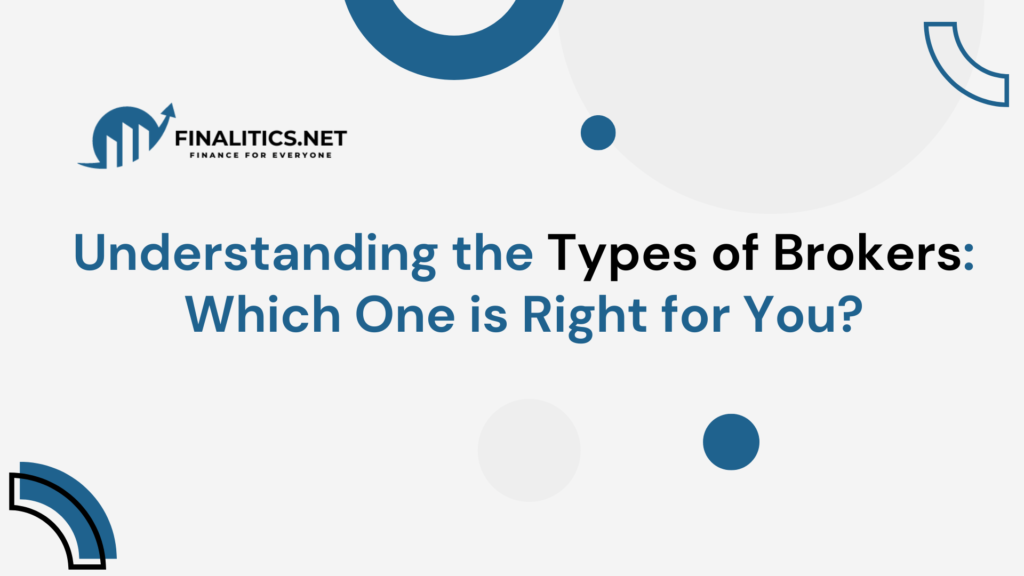When you step into the world of investing, one of the first decisions you’ll face is choosing the right broker. Brokers are financial intermediaries who help you trade securities like stocks, bonds, and mutual funds. But did you know there are different types of brokers, each suited to different types of investors?
In this guide, we’ll explore the two main types of brokers—full-service brokers and discount brokers—along with their pros, cons, and examples. Whether you’re a beginner or a seasoned trader, understanding these options will help you make informed decisions.
What Is a Broker?
A broker is a professional or a platform that facilitates buying and selling financial securities. Think of a broker as the bridge between you and the stock market. They ensure your trades are executed and your investments are managed safely.
Why Do You Need Brokers?
When you decide to invest, you can’t simply walk into the stock market and start buying shares. Instead, you go through a broker. A broker is like a bridge that connects you to the stock market. Think of them as your middleman, ensuring your trades are executed and your investments are safely stored.
However, not all brokers are created equal. There are two main types: full-service brokers and discount brokers. Let’s explore them.
Full-Service Brokers: Personalized Financial Guidance
What are Full-Service Brokers?
Full-service brokers provide a wide range of services beyond just trading. They act as your financial advisor, offering tailored advice and comprehensive support for your investment goals.
What Do Full-Service Brokers Offer?
- Trading Assistance: They execute trades on your behalf.
- Investment Advice: Offer recommendations based on detailed research and market analysis.
- Portfolio Management: Help you create and manage a diversified investment portfolio.
- Research Reports: Provide in-depth insights into market trends and individual stocks.
- Discretionary Accounts: Allow them to make investment decisions on your behalf (with your permission).
Who Should Use a Full-Service Broker?
Full-service brokers are best for:
- Beginners who lack investment knowledge.
- Busy professionals who don’t have time to manage their portfolios.
- Investors seeking personalized advice and financial planning.
Example of a Full-Service Broker
Imagine Emily, a doctor who dreams of retiring early. She hires a full-service broker who creates a portfolio of real estate, healthcare, and technology stocks aligned with her goals. The broker also rebalances her portfolio regularly based on market conditions.
Pros of Full-Service Brokers:
- Expert Guidance: Ideal for investors who need professional advice.
- Comprehensive Services: They offer additional services like tax planning and retirement planning.
- Convenience: They handle all the complexities of trading and investing.
Cons of Full-Service Brokers:
- High Costs: They charge significant fees and commissions, which can eat into your returns.
- Conflict of Interest: Some brokers may recommend investments that earn them higher commissions.
Discount Brokers: Affordable and Self-Directed Trading
What are Discount Brokers?
Discount brokers are designed for investors who prefer a hands-on approach. They provide the essential tools to trade but don’t offer personalized advice.
What Do Discount Brokers Offer?
- Trade Execution: You can buy and sell securities online at your convenience.
- Low Fees: Their fee structure is minimal, with many offering zero-commission trades.
- Basic Tools: Provide platforms with stock charts, real-time prices, and basic research tools.
Who Should Use a Discount Broker?
Discount brokers are ideal for:
- DIY Investors who enjoy managing their portfolios.
- Cost-conscious traders looking to minimize fees.
- Active Traders who frequently buy and sell securities.
Example of a Discount Broker
John, a tech enthusiast, opens an account with a discount broker. He uses their app to research and invest in tech stocks like Tesla and Apple without paying high fees.
Pros of Discount Brokers:
- Low Costs: Perfect for investors looking to save on commissions.
- Convenience: Most platforms are online and available 24/7.
- Control: You have full control over your investment decisions.
Cons of Discount Brokers:
- No Personalized Advice: You’re on your own when making investment choices.
- Limited Services: They don’t offer advanced services like financial planning or tax advice.
- Risk of Mistakes: Beginners may find it challenging to navigate the market without guidance.
Full-Service vs. Discount Brokers: A Quick Comparison
| Feature | Full-Service Brokers | Discount Brokers |
|---|---|---|
| Services Offered | Advice, research, portfolio management | Basic trading and tools |
| Cost | High fees and commissions | Low to zero fees |
| Personalization | High (tailored advice) | Low (self-directed) |
| Best For | Beginners, busy investors | DIY, cost-conscious traders |
| Examples | Merrill Lynch, Morgan Stanley | Robinhood, Fidelity, E-TRADE |
How to Choose the Right Broker
Choosing between a full-service and discount broker depends on your needs, knowledge, and investment goals.
Go with a Full-Service Broker if:
- You’re new to investing and need guidance.
- You have complex financial goals like retirement planning.
- You value personalized advice over cost savings.
Opt for a Discount Broker if:
- You’re confident in making your own investment decisions.
- You want to save money on fees.
- You’re an active trader who needs a fast, low-cost platform.
Conclusion
The type of broker you choose can significantly impact your investment journey. Full-service brokers provide personalized support but come at a higher cost, making them suitable for beginners and busy professionals. On the other hand, discount brokers are budget-friendly and empower self-directed investors to take control of their trades.
By understanding the pros and cons of each broker type and aligning your choice with your financial goals, you’ll be well on your way to building a successful investment portfolio. Happy investing!
Relevant Links:
